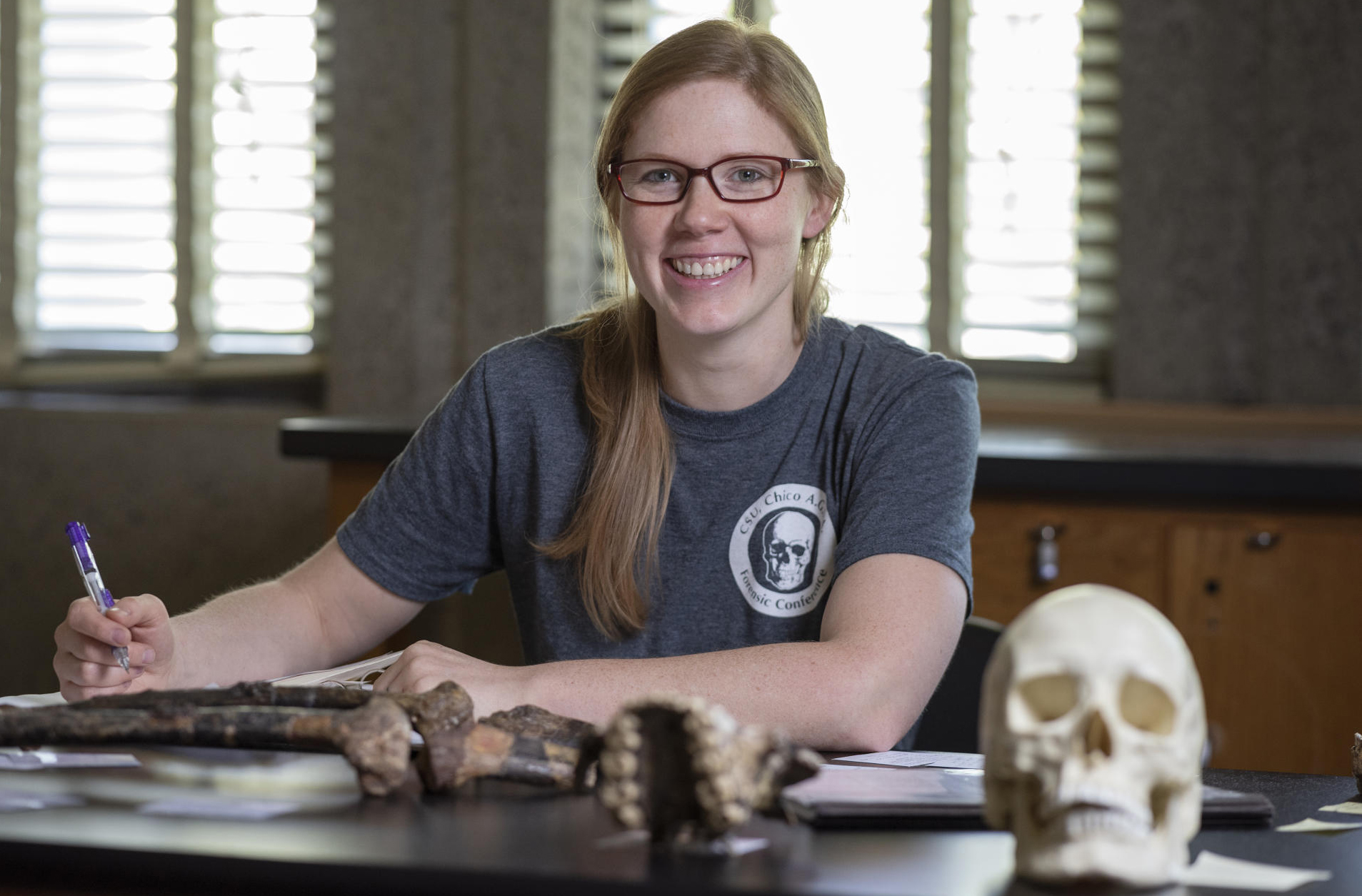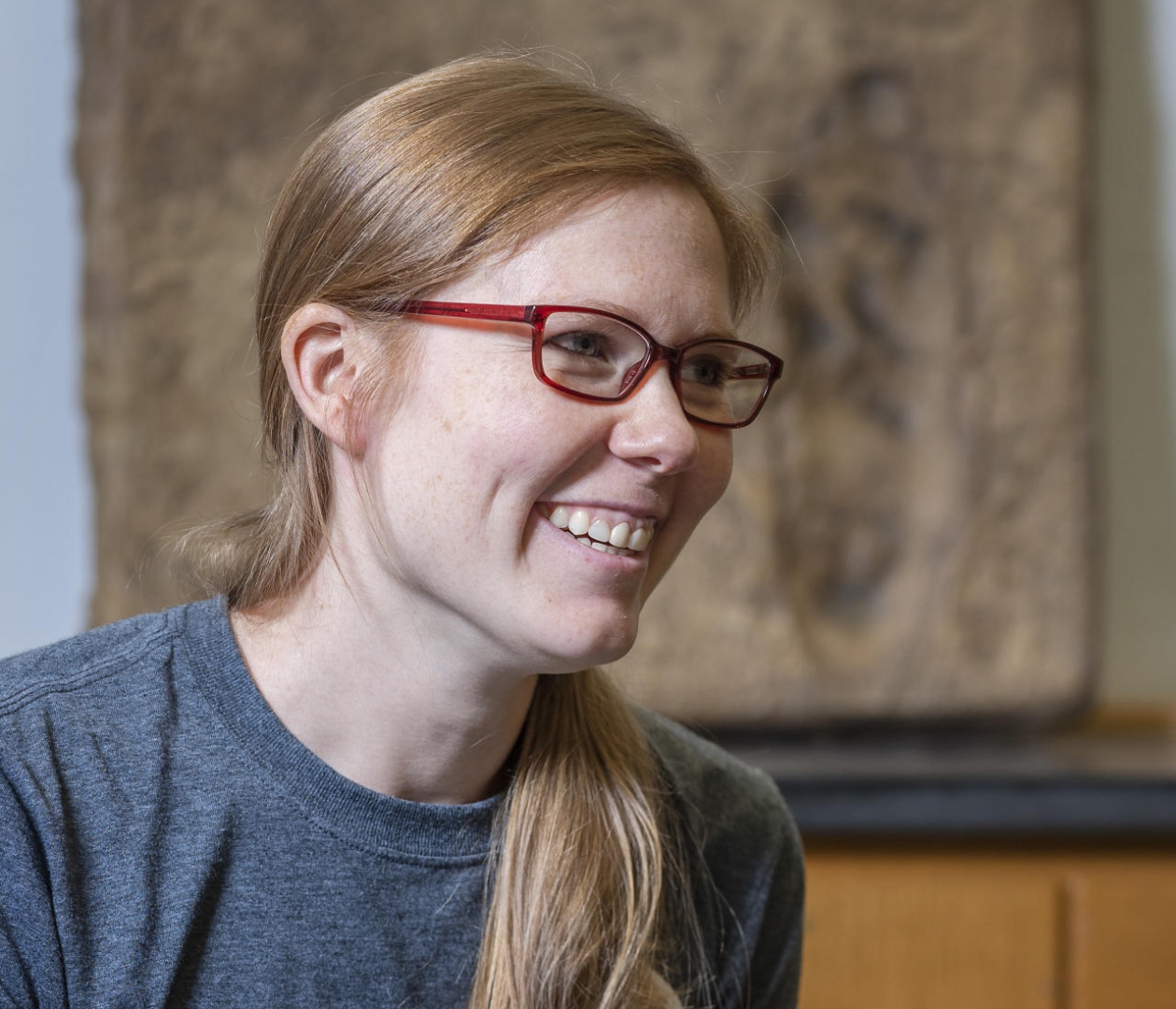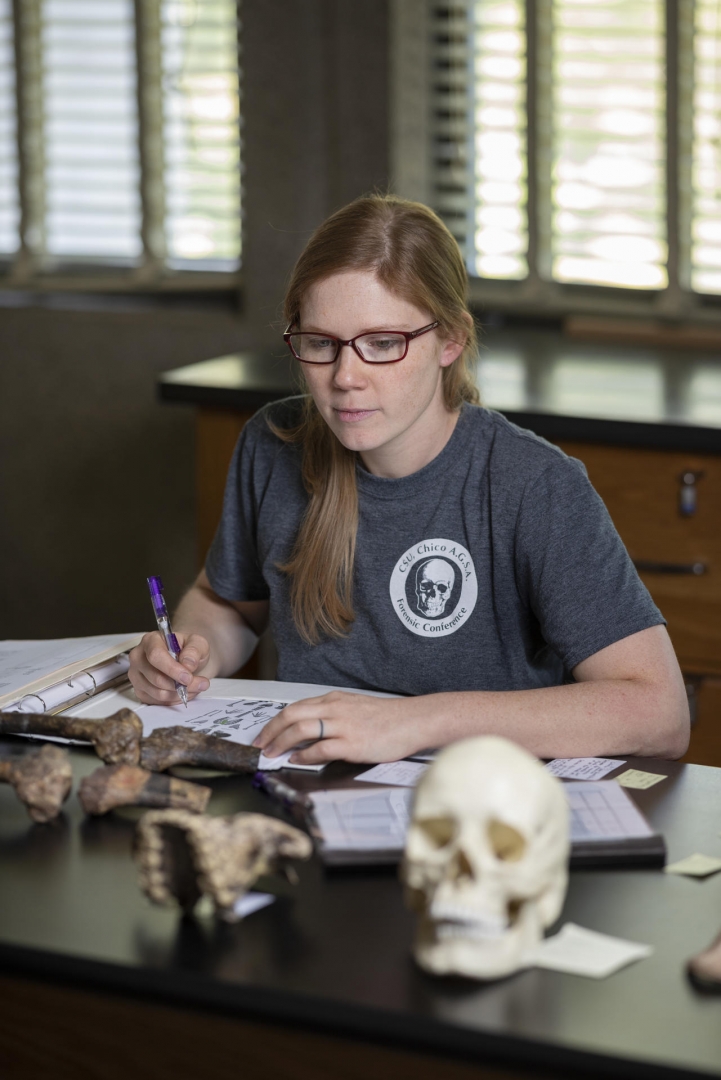Chile to Chico: Fulbright Student Focuses on Forensic Anthropology

Forensic anthropology student Jacqueline Galimany is a Fulbright scholar, on exchange from Chile, and working in the Human Identification Laboratory on Tuesday, June 19, 2018 in Chico, Calif. (Jason Halley/University Photographer/CSU Chico)
The more Jacqueline Galimany learned about the Pinochet-era torture, murder, and disappearances in her native Chile, the greater became her disgust and desire to do something about her country’s violent past.
“You can’t look the other way. You hear the stories and it’s just terrible,” she said. “There are all these families still looking for their loved ones. They are stuck in that moment where [the government] took away their son or daughter.”
The National Commission on Political Imprisonment and Torture reports that approximately 27,255 individuals were tortured and 2,279 were executed during Chilean dictator Augusto Pinochet’s rule from 1973–90. Thousands of suspected leftists simply “disappeared,” never to be seen again, although unmarked graves continue to be discovered to this day.
“You do not get closure until you know what happened or you see the remains,” said Galimany, a graduate student whose interest in forensic anthropology began in her teens. “I could help doing the work that I like.”
Today, as a visiting Fulbright Scholar and international student at Chico State, she is pursuing her master’s degree in anthropology and aspires to eventually earn her PhD so she can return to Chile to investigate criminal cases and human rights abuses. Her ultimate goal is to bring truth and closure to families, helping them to heal.
After earning her undergraduate degree in 2013 and a professional degree in 2015, both in physical anthropology, at University of Chile, Santiago, Galimany looked for elite master’s programs around the world to further her education.
In choosing Chico State, she became only the third visiting Fulbright scholar that now-retired international student advisor James Luyirika-Sewagudde Jr. can recall in the last 45 years. It is the University’s distinct honor to host such prestigious academics and be part of one of the most competitive exchange programs in the world, he said.
“Our participation in the Fulbright-Hays Program serves a three-pronged purpose: to support efforts of the US Department of State to promote international understanding, to give us a chance to learn from and with the scholar, and finally, to support Jacqueline in her preparation for her goals,” he said. “This is a very special partnership which we deeply value and are committed to cultivate.”

The caliber of Chico State’s internationally renowned forensic anthropology program was a key influencer in Galimany’s final decision, and she was especially drawn to the department’s intimacy. With a reputation as a close-knit department where graduate students work directly with faculty, she felt Chico State’s program would allow her the “bone hours” she wanted and needed for her career.
“It was more personalized,” she said. “And everyone told me it was better and that you work hands-on with real cases.”
That has certainly been true. In addition to working as a teaching assistant for introductory anthropology courses, she has contributed to major research projects, including looking at how drowning victims’ bodies travel in the Sacramento River, and the recovery and piecing together of Native American remains from a Glenn County canal.
Galimany also has assisted the University’s Human Identification Lab (HIL) with several investigations and recoveries, including searching for human remains in the Mendocino County fires in 2017 as well as in November’s Camp Fire in Butte County.
The diversity of cases she has experienced has made her time at Chico State a more powerful learning opportunity than she ever imagined, she said. And it has compelled her to think critically, examining her subjects for every possible answer in pursuit of the truth.
Galimany’s persistence and determination made an immediate impact on her faculty. Engaged and energetic, she has clocked far more hours in the HIL than any of her peers, tackles some of the lab’s most obscure and extreme cases, and helps guide the undergraduate interns, who benefit from her expertise and leadership.
“She is amazing. She is the most tenacious student I have ever seen,” said professor Ashley Kendell. “She never turns down an opportunity. She is usually the first to volunteer for every single case we have and every field recovery.”
Beyond her enthusiasm, Galimany is incredibly skilled and works exhaustingly to further her comprehension and knowledge, Kendell said.
“If there is something she doesn’t understand, she will push you to tell her more, teach her more, or she will go out and learn it on her own,” Kendell said. “She definitely catches me off guard sometimes. You think, ‘Wow, I have never thought of that.’ But her mind is always thinking, and as a professor, she definitely keeps you on your toes.”

In addition to her passion for forensic anthropology, Galimany’s strong sense of ethics will bode well for what she plans to do with her education, Kendell said. And the perspective that she brings from her life and studies in Chile has been really enlightening to her faculty and American peers.
“She has seen different things than our [other/American] students and she is very willing to talk about those things in class discussions,” she said. “It has made my classes more well-rounded and given other students a different way to view the skills we are teaching and the application of the skills they are learning.”
Galimany also demonstrates great initiative, conducting her own research to gain better insight into cases she is assisting with, presenting at conferences, and co-organizing the 16th annual Chico Forensic Conference in November 2019, which brings national and international forensic experts to share their knowledge with the University, the community, and others across their discipline.
The topic of her thesis is age-at-death estimation traits, considering a new unpublished method that looks at developmental and degenerative changes throughout the skeleton. With help from professors Kendell and Eric Bartelink, Galimany sought out one of the method’s developers, invited her to be on her thesis committee, and brought her to Chico State to host a workshop for faculty and students.
“Like in sports, some people bring more to the game than just their play,” said former HIL Director P. Willey. “Jacqueline brings more to our profession, and she juggles it all, and she excels.”


